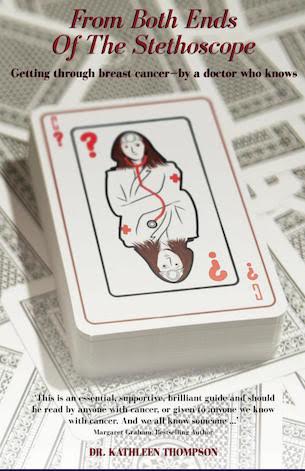Why did you write the book?
When I was diagnosed with breast cancer, I was surprised how hard I found it, even as a doctor, to navigate my way through the tests and treatments. It made me realise how much more difficult it must be for someone without any medical knowledge. This book is to help those people. I also wanted to give an insight of what it was like to have cancer, for the benefit of the friends and relatives of people with breast cancer.
What is your book about?
It uses my personal breast cancer experiences to guide people through their breast cancer treatment, explaining the various tests and procedures. It points them to further information sources too. Although full of information, it is simply written, in order to be easily absorbed by someone in a state of shock.
Later in the book I explain medical research. The internet is a fabulous source of information. The trouble is, it doesn’t have a truth-filter. Anybody can post anything, and there are numerous ‘cancer cures’ which are unsubstantiated and sometimes dangerous. When you have a serious illness, it is tempting to try anything. So, for these reasons, I explain how to assess whether a claim is valid, or whether it is misleading.
Finally I talk about the causes of cancer and what we can do to reduce our chances of contracting it – and it is surprising how much we can do.
What is the most important message of your book?
Take control. We lose control of our lives the moment we are told we have cancer—take it back. Don’t relinquish that control to anyone, even to your medical carers. They may do a fantastic job, but in the end, you are the one with the most at stake. You need to understand all your treatment options, discuss with your doctor, and then decide which are best for you, and make sure you get them.
Who will your book help and in what way?
Firstly it will help people going through breast cancer, or other cancers, as much of the information extends to all cancers.
Equally it will help the relatives and friends of people diagnosed with cancer.
It will also be of interest to anyone who enjoys reading about personal experiences and who is interested in improving their health, reducing their cancer risk and understanding medical research
Did being a doctor help you get through breast cancer?
In many ways, yes it did, and that is why I want to share my ‘inside knowledge’ with others. In some ways, though, it didn’t, and I felt as vulnerable, bewildered and uncertain about what to do as anyone else.
Can we do anything to help lower our cancer risk?
Absolutely yes—it is surprising how much we can do. Of course some people have a higher risk of cancerthan others, and sometimes, however hard you try, you can’t prevent it. But for many of us, we can shift along the seesaw of cancer risk—and so make ourselves go up, and not down.
Frost found From Both Ends Of The Stethoscope impressive, and important. If you know anyone who could use help after a diagnosis, don’t hesitate to point them towards the book.
From Both Ends Of the Stethoscope is available from all good bookshops and Amazon.co.uk

